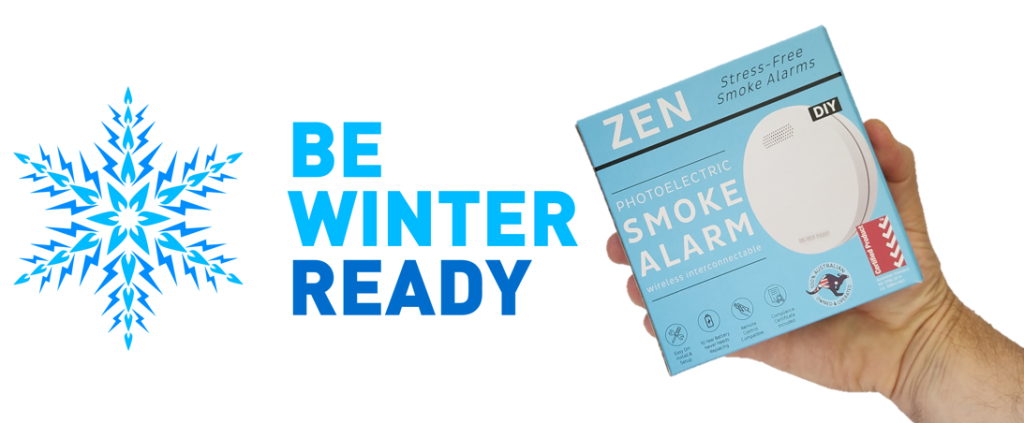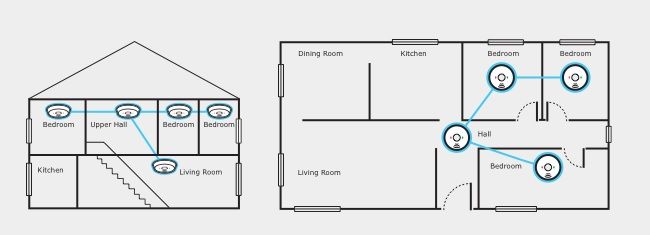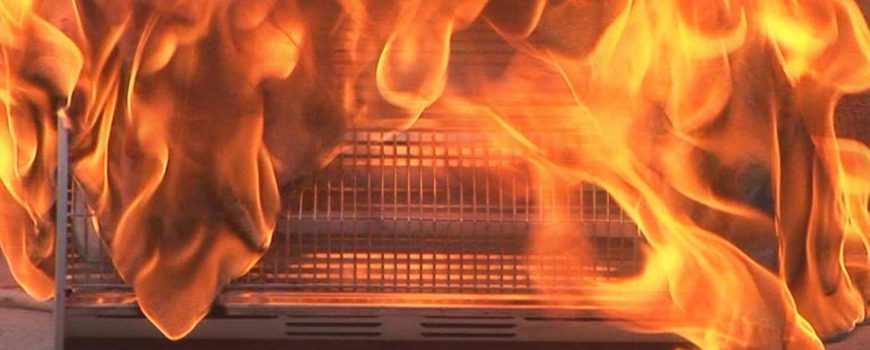As winter settles in across Australia, the chill in the air sends us reaching for heaters, fireplaces, electric blankets, and other devices to keep warm. Even in Queensland, known for its humid climate, winter nights can get surprisingly cold, and some areas even see snowfall. While these heating methods provide much-needed comfort, they also come with an increased risk of household fires – are your photoelectric smoke alarms up to it?
Fire services nationwide report a significant spike in fire-related incidents during the colder months – in fact winter is the peak season for house fire call-outs. This heightened risk means it is vital that your home is not only equipped with interconnected photoelectric smoke alarms, but proper winter fire safety precautions are followed. This article is a 2 minute read and will guide you through essential fire safety tips to keep you and your family safe this winter.
Photoelectric Smoke Alarms in Winter

ZEN photoelectric smoke alarms – be winter ready!
Why Photoelectric Smoke Alarms Matter In Winter
Interconnected photoelectric smoke alarms are your first line of defence against house fires. When every second counts, working photoelectric smoke alarms can provide the early warning needed to escape safely. Winter is the peak season for house fires in Australia, and according to Queensland Fire and Emergency Services (QFES), having functional photoelectric smoke alarms can double your chances of surviving a house fire.
Where To Install Photoelectric Smoke Alarms
For optimal protection, install photoelectric smoke alarms inside every bedroom, in the hallways outside sleeping areas, and on every level of your home. These photoelectric smoke alarms should be interconnected, so if one alarm sounds, they all do. While ZEN Smoke Alarms can be mounted on both walls and ceilings, ceiling installation is preferred since smoke rises. If you must install them on a wall, position them high but at least 30 cm away from corners to avoid dead air spaces. Steer clear of placing them near open windows, doors, or air vents where drafts could disrupt their function.

Clean And Test Your Photoelectric Smoke Alarms
At The Start Of Winter
To ensure your photoelectric smoke alarms are ready when you need them most, give them a thorough clean at the start of winter. Dust, cobwebs, and other particles can accumulate over time, reducing their effectiveness. Gently vacuum the exterior of each alarm with a soft brush attachment.
Test your photoelectric smoke alarms monthly to ensure they are functioning correctly and interconnected. All alarms should activate their audible and visual indicators within 10 seconds of the first one being tested. With ZEN Smoke Alarms, you can press the center surface of any alarm or use the optional remote control to conduct this test. The test mode will automatically silence after about 10 seconds.
Winter Heating Equipment: Safety First
Space Heaters
One of the main culprits behind winter house fires is the misuse of heating equipment. When using space heaters, keep them at least one meter away from flammable materials like curtains, bedding, and furniture. Never place clothing on or near the heater, ensure it’s on a stable surface, and never leave it unattended, especially while you’re sleeping.
Fireplaces In Winter
Before lighting up your fireplace for the winter season, have it inspected and then cleaned regularly to prevent the buildup of creosote, a highly flammable byproduct of burning wood. Always use a fire screen to catch sparks and embers, and make sure the fire is completely extinguished before going to bed or leaving the house.
Electric Blankets
Check your electric blankets and heating pads for frayed cords or other damage before use. Never fold them or leave them on for extended periods. To test an electric blanket, lay it flat on the bed and switch it on for five minutes to ensure it’s working properly before using it.
Winter Wheat Bags
Wheat bags are great for soothing aches and pains, but they’re not designed to replace hot water bottles in the bed. Be careful not to overheat them in the microwave, as repeated use can reduce their moisture content, increasing the risk of overheating and fires. Always let them cool on a non-combustible surface, like a kitchen sink, and never reheat until they’re completely cooled. Follow the manufacturer’s instructions regarding their lifespan.
Safe Use of Electrical Appliances
Winter often means increased use of electrical appliances, which can overload circuits and cause fires. Avoid using multiple high-wattage devices on the same outlet and don’t use extension cords for long-term connections. Regularly check all cords for wear and tear and replace any that are damaged. Opt for power boards with built-in overload protection.
Kitchen Safety In Winter
Winter calls for hearty meals and more cooking, but ensure your kitchen remains a fire-free zone. Never leave cooking unattended and keep flammable items like tea towels away from the stove-top. It’s wise to have a ZEN fire blanket easily accessible in the kitchen, and know how to use it properly.
Practice The Home Fire Escape Plan At The Start Of Winter
Interconnected photoelectric smoke alarms are most effective when combined with a well-rehearsed home fire escape plan. Make sure everyone in your household knows the sound of the smoke alarm and understands what to do when it activates. Plan two ways out of every room and allocate a meeting place outside your home. Practice your fire escape plan twice a year, including at the start of winter, to ensure everyone is prepared.
Conclusion – Photoelectric Smoke Alarms In Winter
Winter is a wonderful time to enjoy the warmth and comfort of your home, but it’s also a time to be extra vigilant about fire safety. By installing and maintaining interconnected photoelectric smoke alarms, using heating equipment and electrical appliances sensibly, and having a solid fire escape plan, you can keep your loved ones safe. Stay warm, stay safe, and make sure your photoelectric smoke alarms are ready to protect you from winter’s hidden dangers!

Want to know more? Watch our ZEN Smoke Alarm YouTube channel or call us on 0478 596 402 today
We love talking smoke alarms!
ZEN Interconnected Smoke Alarms
New Farm, QLD, 4005

